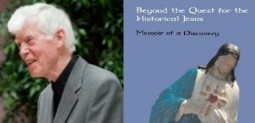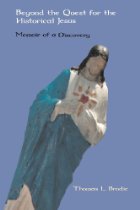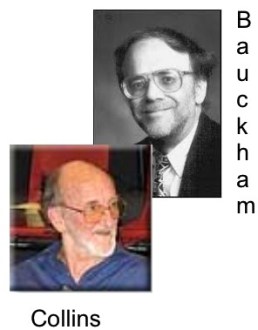 Chapter 13
Chapter 13
The Quest for History: Rule One
.
The theme of chapter 13 in Thomas Brodie’s Beyond the Quest for the Historical Jesus: Memoir of a Discover syncs well with a recurring theme on this blog. I have posted on it repeatedly and alluded to it constantly. I even posted on the contents of this chapter 13 soon after I began reading Brodie’s book and before I considered doing this series. That earlier post was Quest for History: Rule One — from Brodie’s Beyond the Quest for the Historical Jesus.
Many scholars of Christian origins (biblical and religion scholars, theologians) write in the belief that the most important thing to grasp about the narratives and sayings in the Gospels is the historical context that gave rise to them.
And yet, and yet, and yet. Being first in importance does not necessarily mean being first in the order of investigation. The first thing to be sorted out about a document is not its history or theology — not the truth of background events or its ultimate meaning — but simply its basic nature.
For instance, before discussing a will — its possible many references to past events, and its provisions for distributing a legacy — the first thing to be established is whether it is genuine, whether it is a real will. (p. 121, my bolding)
Its basic nature! The nature of the text we are reading! Exactly. One theologian who regularly refers to himself as a historian has insisted that historical analysis of the Gospels has nothing to do with literary analysis and that literary analysis has no relevance for historical analysis. That is flat wrong. Even at a very superficial level everyone necessarily does some form of literary analysis in order to determine how to interpret the content of what they are reading. Is what we are reading a diary, a parody, an advertisement, an official news report, a novel? Deciding that question involves some basic level of literary analysis.
The commonly expressed view that the Gospels are a form of ancient biography actually arises more from the a priori assumption that they contain or are based ultimately on biographical data than a theoretical analysis of the genre. For an analysis of the influential work of Burridge (whose work arguing for the Gospels being a form of biography is widely taken for granted but less widely analysed critically) see other Vridar posts in the Burridge archive. For discussions of a work that is, by contrast, a theoretically grounded analysis of the genre of the Gospel of Mark see the Vines archive.
(Unfortunately not even classical studies helps much here since, I’ve been informed, questions of genre generally remain fairly fluid in that department. But biblical studies does elicit certain distinctive questions critical for cultural reasons so genre analysis of biblical literature does deserve to be taken more seriously.)
But enough of my take. This series is meant to be about Brodie’s views. So for the sake of completeness I have decided to copy my earlier post within this series here. If you’ve already read it then think of this as a refresher. It’s a topic that can’t be overstated given that it appears to be utterly lost on the bulk of the present generation of scholars of Christian origins.
 The new addition to my bookshelf and I are going to get along just fine. I feel like I’ve found a long-lost friend, someone who has published exactly the point I have been making on this blog for so long now, only this new friend was saying it long before it ever crossed my mind.Chapter 13, “The Quest for History: Rule One” in Thomas Brodies’ Beyond the Quest for the Historical Jesus, begins: The new addition to my bookshelf and I are going to get along just fine. I feel like I’ve found a long-lost friend, someone who has published exactly the point I have been making on this blog for so long now, only this new friend was saying it long before it ever crossed my mind.Chapter 13, “The Quest for History: Rule One” in Thomas Brodies’ Beyond the Quest for the Historical Jesus, begins:
This is not unlike my experience of wondering how historians can know anything at all about the existence of persons millennia ago. Few biblical scholars seem ever to have given this serious attention. The existence of certain persons seems to be mostly taken for granted. When Bart Ehrman attempted to grapple with this question (apparently for the first time) in his book, Did Jesus Exist?, it was clear he was merely opining off the top of his head and had never before seriously thought through the question in relation to a range of persons and sources. He began by saying a photograph would be proof — failing to grasp what should have been the obvious fact that a photograph is meaningless to anyone who has no idea of the existence and identity of the person in the first place. He had never thought the question through. Nor have scholars like McGrath and Hurtado who merely parrot as a given that scholars agree Hillel and Socrates existed so they did. When pushed, they can do nothing better than fall back on “scholars in their collective wisdom agree”. (Two posts in which I discuss this question: How do we know anyone existed. . . . , and Comparing the evidence. . . .) Thomas Brodie speaks of an SBL meeting at San Diego in 2007 where Richard Bauckham
Accordingly, Brodie suggest, it seems that Rule One is to “attend to history”.
Brodie narrates a pregnant moment that registered with him in class:
Recollect Churchill’s famous saying:
Brodie acknowledges that “ultimately” both Bauckham and Childs are right: that history and theology (the meaning of the Bible) are of “supreme value”.
Its basic nature! The nature of the text we are reading! That’s exactly what I have been saying is the first task in an exploration of Christian origins. We need first to understand the very nature of the evidence or sources we are using. And yes, that means at some level literary analysis if the sources are literary. McGrath is flat wrong when he says literary analysis is not of interest to the historian. It is of the first and utmost importance. How else can the historian know how to interpret the literary source unless he or she understands its literary nature? I told you I think I have found a new like-minded friend for my bookshelf! Brodie elaborates:
Thompson similarly demonstrates that biblical narratives are so often reiterations of a theological motif. Look how many retellings there are — I can count seven or eight off the top of my head — of the new creation being born through divided waters, from Genesis right through to the Gospels were the motif is transvalued (MacDonald’s term) into the dividing of the heavens. As an example Brodie cites the biblical narrative of the fall of Jericho and archaeological efforts to establish the truth or otherwise of the story.
The drama of the victory at Jericho and ensuing defeat at Ai
[Since posting this I have read J. N. Collins’ article quoted by Brodie, and it is clear that Collins’ argument for the prologue referring to a literary tradition complements (not contradicts) “some process of teaching and learning”. Collins is especially interested in that “process of teaching and learning” in the community.— Neil Godfrey, 15th November, 2012] Collins, in Brodie’s words, faults Bauckham’s work thus:
The Gospel of John, for example, is written in the tradition of Hebrew narrative. Its author, therefore, had every reason to make it look like history. We know that the Old Testament Biblical narratives could look like history even when it is clear they could not be historical. Furthermore, John’s Word is being made flesh, so it is coming “in history” — and hence the narrative for theological reasons must look history-like.
A most elementary fallacyBrodie then targets the common fallacy found in the writings of many biblical scholars, including some recently discussed in my reviews of Jesus, Criteria, and the Demise of Authenticity. Although Bauckham is correct to say that historians were expected to have a thorough knowledge of the places of which they wrote, it does not follow that references to geographical features is evidence of genuine historical writing. Accurate geographical details in fiction, including ancient fiction, are legion. Brodie drives the point home by citing every local geographical feature of the setting used by film-makers to show Superman taking flight. “But that does not make Superman historical.”
I believe this is where I believe Michael Vines’ study of genre theory and its application to the Gospel of Mark is a golden contribution. Burridge’s What Are the Gospels? drew entirely on superficial appearance and style to conclude the Gospels were biographies. Vines, on the other hand, dived into literary theory and discovered what the authors were really doing and that superficial appearances were badly misleading. Locating the sourcesAnother central factor for the historian is the identification of the sources of a text like the Gospel of John and how the author uses them. Brodie refers to Jesus’ journey from Jerusalem and Judea (in the Gospel of John) to Samaria and Galilee – John 2:23-4:54 – and how it is unlike any journey in the Synoptics. It does, however, correspond to the journey of the Word of God in Acts 1-8. There are many details to corroborate John’s dependence upon Acts (Heffernan 2009).
But here is the problem.
Brodie tells us that in September 2007 he contacted Bauckham to ask him if he ever explored the question of the relationship between John and the Synoptic Gospels “in the context of the literary relationships of the ancient world, Greco-Roman and Jewish.” A few days later, on 26 September, he replied and said quite simply ‘No’.
Let me quote part of the following paragraph here:
Brodie footnotes another case-study to illustrate this. James Dunn, for example, can detect that Luke is “something distinctive” in the creation of his speeches in Acts, but instead of checking to see if there are verifiable literary explanations, particularly whether Luke might be using the epistles and translating them into new form, he assumes that Luke is drawing on undefined tradition. No solution in eye-witnesses or social memoryIn my earlier posts on Jesus, Criteria, and the Demise of Authenticity and related posts on Le Donne, I address the new scholarly trend to look to social memory to replace the traditional construct of oral traditions. Bauckham has kicked at the weaknesses of the oral tradition explanation for the Gospel narratives, but by replacing it with eye-witness testimony and formal processes of teaching and learning through authoritative persons he has merely replaced “one ghost” with another.
It seems so elementary to me. Why are Brodies’ words not taken as a given among scholars?
Exactly. |
Neil Godfrey
Latest posts by Neil Godfrey (see all)
- What Others have Written About Galatians (and Christian Origins) – Rudolf Steck - 2024-07-24 09:24:46 GMT+0000
- What Others have Written About Galatians – Alfred Loisy - 2024-07-17 22:13:19 GMT+0000
- What Others have Written About Galatians – Pierson and Naber - 2024-07-09 05:08:40 GMT+0000
If you enjoyed this post, please consider donating to Vridar. Thanks!



“Bauckham reads the New Testament data on transmission and witness as historical, without asking sufficiently whether it is actually historical or whether it is simply written to look like history.”
Biblical writers were not historians. They were pseudo-historians. A slight modification, but one with huge implications. Writing a scenario, not based on what actually happened, but what you *wish* had happened, is what Biblical writers do. Thus creating a two-millenia long confusion between theology and history, a tradition that proudly continues with today’s theologians. When their faith delusion fails, they always have the delusion that they’re “New Testament Historians” to fall back on. Ehrman is an example par excellence.